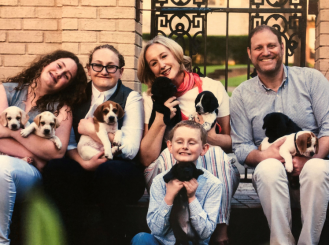Apr 24, 2019
Vice president of Public Policy and Academic Affairs at Texas Oncology and medical oncologist at Texas Oncology Cancer Center; editor in chief of JCO Clinical Cancer Informatics; member of ASCO’s Nominating Committee, White and Brown Bagging Committee, Clinical Practice Committee (CPC) Physician Compensation Workgroup, MACRA Speakers Group, and CPC Payment Reform Implementation Workgroup.
What led you to oncology?
DP: Oncology appealed to me in theory and in practice. As a resident in internal medicine and pediatrics, I was focused on the general, but wanted to dig deep. Oncology allowed you to become entrenched in molecular physiology and was making progress. It allowed you to put all the pieces of a complex puzzle together. That appealed to me. In practice, I enjoy having long-term relationships with my patients and their families. I enjoy helping them navigate something complex and scary and sometimes painful and seeing them thrive on the other side of it. In these ways, oncology both satisfies my curiosity and need for scientific discovery in addition to an emotional desire to help patients and their families.
Later, as a policy and health care informatics specialist in oncology, I developed a great appreciation for the need to optimize the complex systems that facilitate cancer progress: the policies that can support advancements and access to cancer treatment, the informatics solutions that can help improve the quality of care, and the importance of educating the businesses that help support the systems of care delivery. Working to build strong bridges in these areas is a unique and important skill set, and I have found it gratifying to work in these areas to help sustain and advance the field. I have been lucky to have good mentors to help show me the way.
What hobbies do you enjoy?
DP: My husband and I have three children and three dogs, so they keep us pretty busy at home. I like to hike with my dogs. I live in Austin, TX, so we have a lot of great trails in the city. My favorite is the Barton Creek Greenbelt. On the weekends, I will get up early and take two of my dogs in my convertible—top down, of course—on the greenbelt for a long hike. After we hike, I take them through a drive-through to get a breakfast sandwich for them and coffee for me. All in all, a pretty perfect morning. We have a ranch just outside of Austin, too, with many hiking trails. Hiking at the ranch amidst the trees with the Colorado River in sight is my definition of heaven.
What’s the last book you read?
DP: I am currently reading one of the books on the life of Lyndon B. Johnson, Master of the Senate. I just finished The Fifth Risk by Michael Lewis.
Do you have a personal motto?
DP: I have a favorite quotation by E.B. White: “I get up every morning determined to both change the world and have one hell of a good time. Sometimes this makes planning my day difficult.”
What career could you see yourself in if you weren't an oncologist?
DP: I think I would be happy doing many things, but I would probably be a scientist or an informatics specialist and not a clinician.
What changes do you envison for the field in the next 10 years?
DP: Our landscape of oncology is changing so dramatically. Cancer care in 10 years will be more of a chronic illness than it is today. This won't be true for all cancers, but for many. We will continue to learn about drivers of cancer growth and target them specifically to suppress cancer growth. We will better harness our own immune system to help. All of these incredible innovations, though, have been expensive. We will have to confront more meaningfully how to pay for it, and how to facilitate delivery of value-based medical care.
What would you say to a young physician thinking about entering the field of oncology?
DP: We need you! It is the most exciting time to be an oncologist. I often compare it to being an infectious disease doctor in the 1930s. We have a blossoming landscape of new therapeutic intervention. We need you to be different, though. You can’t just be a good clinician. We need many of you to excel around the edges and help stabilize cancer care over time: through good science, reasonable policy, effective advocacy, businesses that allocate capital to facilitate progress, and solutions that make our clinicians more efficient and effective. So, those other things you thought you didn’t have time for when you were studying hard to learn the biochemical reactions of the Krebs cycle, revisit those. We need you to use them to help cancer care.

